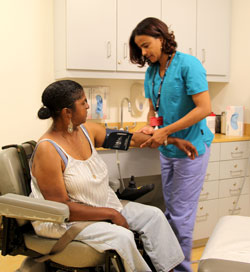South
Huntington Team-Based Primary Care Practice Marks First Anniversary

Ana Maria Brandao takes patient Dawn Pulley’s
blood pressure. |
Boston resident Dawn
Pulley learned that she had type 2 diabetes when she was just 19 years old.
Diabetes runs in her family; her parents and grandparents had it, and two of
her three siblings are also diabetic.
"It was different
for all of us," said Pulley, who is now 47. "I was a teenager when I
found out about it, so it was hard for me to believe. I wasn't paying close
attention to it, which, as a result, led to significant health problems for me,
even though I knew some of the risks of the disease."
At age 25, Pulley
began to take her health more seriously and started going to another hospital
for insulin shots. But her health didn't improve, and she eventually suffered a
massive stroke at age 40, leaving her paralyzed on one side of her body.
After her stroke,
Pulley continued to receive treatment to manage her diabetes. But it wasn't
until last year, when she became a patient at Brigham and Women's Advanced
Primary Care Associates, South Huntington, in Jamaica Plain, that Pulley
finally began to feel more in control of her health.
The practice is
celebrating its one-year anniversary this month. Created as a "learning
laboratory" for team-based care as one component of BW/F's primary care
strategic commitments, the South Huntington Avenue practice has seen tremendous
growth since it opened its doors, expanding from 500 patients in its first month
to roughly 3,300 patients today.
"With the support
of the hospital, our goal was to implement a practice that most closely
resembled a fully-functioning ‘patient-centered medical home' in order to
identify those successful components that we could then ‘export' to our other
13 practices," said Joseph Frolkis, MD, PhD, vice chair of Primary Care.
"Even after a year, that investment is showing an impressive return in
terms of improved outcomes, patient satisfaction and increased access. The
practice has assembled a terrific and committed team that is truly ‘walking the
walk' of team-based care."
Pulley, a former
special education teacher for Boston Public Schools, says she didn't know the
specifics of diabetes until coming to South Huntington.
"I began seeing
Dr. Barnett and Dr. Pollack there, and they took the time to talk with me about
it," she said.
In addition to visits
with physicians Michael Barnett, MD, and Stuart Pollack, MD, South Huntington's
medical director, Pulley's personalized care plan has included sessions with
full-time, on-site dietitian Mara Sansevero, RD, CDE, pharmacist Sonia Freitas,
PharmD, and social worker Lara Sullivan, MSW, LICSW, who recently helped Pulley
get a new wheelchair.
"My blood glucose
levels have been low, and my cholesterol is down," said Pulley, who has
monthly appointments at the practice. "I am feeling great. The team
continues to provide wonderful care to me. The doctors and other members of the
team monitor me every step of the way, and everyone is so friendly. I love them
like they're my family."
Pulley is an example
of how population management and care coordination have improved outcomes for
diabetic patients at the South Huntington practice. The practice has 158
diabetic patients who have been with the care team long enough to have
undergone more than one A1C test, which provides information about one's
average blood sugar level over a three-month period. Thirty-one percent of the
158 patients had blood sugar levels that were extremely poor upon coming to the
practice. When tested three to six months later, that poorly-controlled group
fell to 24 percent.
Asaf Bitton MD, MPH,
South Huntington's assistant medical director, has been evaluating the
implementation of the model as well as health information technology approaches
for improving patient engagement and clinical quality, including diabetic
patient management.
"We have seen
success in disease management among our diabetic patients at South Huntington
in a relatively short period of time," said Bitton. "We are finding that
‘care teams' lead to more personalized approaches to patient care and healthier
patient outcomes."
Pollack also believes
that the success of the site, and the model in general, lies in its integrated,
team-based approach.
"The care is
delivered by a team of clinicians all in one place and mixes professions
together for synergy and different expert viewpoints," Pollack said.
"We find out what's important to each patient; different members of the
team get to know different patients well, depending on who the patient builds a
relationship with and which member of the team has the knowledge to help the
patient do the hard work of managing their own chronic disease. Once you make
an investment in people, they really respond and their care improves as a result."
Pollack added that the
site recently began holding group education visits for pre-diabetes and other
health conditions, another element of population management that the team hopes
to build upon.
The patients are
responding. Pollack and practice manager Linda Jo Stern, MPH, say the practice
has been scoring in the 90th percentile on patient satisfaction surveys. Many
patients did not have a primary care physician before coming to the practice.
"South Huntington
was also the highest-rated choice for training among BWH primary care medical
residents this year," Stern added.
Looking ahead to year
two and beyond, Pollack, Stern and other members of the South Huntington care
team expect to see continued growth, as the demand for primary care continues;
the practice has the capacity to see 10,000 patients.
As for Pulley, she
plans to keep receiving care from her South Huntington team.
"Since they've
been working with me, I feel much better," she said. "I am really
grateful to my team there."
Read the Sept. 23,
2011 BWH
Bulletin story announcing the opening
of Brigham and Women's Advanced Primary Care Associates at BWHPikeNotes.org.
For more information about the practice, visit www.brighamandwomens.org/southhuntington.